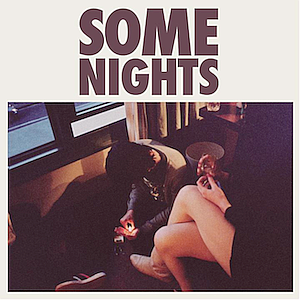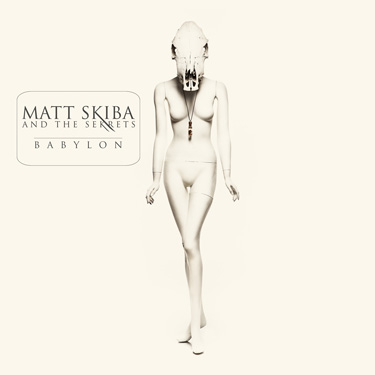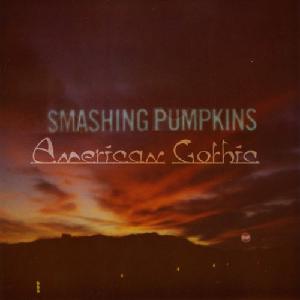Revisiting the spirit of our Most Anticipated List back in January, Matt and I decided to have a look back at the year it’s been for music as well as what’s to look forward to for the rest of 2011.
First Half Surprises
Matt: In our Most Anticipated Post that we did in January, Mike and I had five bands each that we spotlighted as usboth looking forward to. Of those five, three artists have already released new material. Two of them I am putting in a tentative top five of the year: Manchester Orchestra’s Simple Math and Death Cab for Cutie’s Codes & Keys. Both showed the growth of their respective band’s discography as each are at new points in their career. Simple Math takes a few listens to really sink in, but when it does it grabs a hold and doesn’t let go. And while DCFC’s Plans is one of my favorite albums of all time, Narrow Stairs just didn’t grab me in that same way. But the soft tones and simple yet sophisticated lyrics of Codes & Keys have made it one of my most played albums of the year.
In our Most Anticipated Post that we did in January, Mike and I had five bands each that we spotlighted as usboth looking forward to. Of those five, three artists have already released new material. Two of them I am putting in a tentative top five of the year: Manchester Orchestra’s Simple Math and Death Cab for Cutie’s Codes & Keys. Both showed the growth of their respective band’s discography as each are at new points in their career. Simple Math takes a few listens to really sink in, but when it does it grabs a hold and doesn’t let go. And while DCFC’s Plans is one of my favorite albums of all time, Narrow Stairs just didn’t grab me in that same way. But the soft tones and simple yet sophisticated lyrics of Codes & Keys have made it one of my most played albums of the year.
The third one in the above of category was the self-titled  release from Taking Back Sunday. Admittedly, these guys are one of my top two favorite artists so any music from them I am going to like. And I gravitated toward this release instantly, but noticed something when I finally took it out of my car - I never put it back in. Don’t get me wrong, if I hit play I still enjoy most of the tracks, but it’s missing that “I have to listen to this all the time” element. Two other bands that sort of had the same “We’ve been gone for a while/had lineup changes” sort of story was Panic! At The Disco and Yellowcard. Both came out with albums in the spring and both did their job. They weren’t great – but they were satisfying and showed that both may be back on track.
release from Taking Back Sunday. Admittedly, these guys are one of my top two favorite artists so any music from them I am going to like. And I gravitated toward this release instantly, but noticed something when I finally took it out of my car - I never put it back in. Don’t get me wrong, if I hit play I still enjoy most of the tracks, but it’s missing that “I have to listen to this all the time” element. Two other bands that sort of had the same “We’ve been gone for a while/had lineup changes” sort of story was Panic! At The Disco and Yellowcard. Both came out with albums in the spring and both did their job. They weren’t great – but they were satisfying and showed that both may be back on track. As stated earlier, with all the attention on the heavy hitters returning this year (Foo Fighters, Radiohead - both with good releases in their own rights) there was room for some newcomers to step up and provide a spark. In my opinion, Foster the People answered that call. When they debuted with “Pumped Up Kicks,” the band hadn’t even recorded other tracks for an album. But when Torches was released, there were more than just “those guys that kind of sound like MGMT.” Foster the People could end up being the best new artist of the year. Other surprises for me this year included how much I liked the Sublime With Rome album and gravitating to Sum 41’s Screaming Bloody Murder after hearing “Jessica Kill.”
As stated earlier, with all the attention on the heavy hitters returning this year (Foo Fighters, Radiohead - both with good releases in their own rights) there was room for some newcomers to step up and provide a spark. In my opinion, Foster the People answered that call. When they debuted with “Pumped Up Kicks,” the band hadn’t even recorded other tracks for an album. But when Torches was released, there were more than just “those guys that kind of sound like MGMT.” Foster the People could end up being the best new artist of the year. Other surprises for me this year included how much I liked the Sublime With Rome album and gravitating to Sum 41’s Screaming Bloody Murder after hearing “Jessica Kill.”
Honorable Mentions: The Childish Gambino E.P. from “Community” star Donald Glover; Suburbia I’ve Given You All & Now I’m Nothing from The Wonder Years (thanks Liz); the overall album quality of Bayside’s Killing Time and some new artists (for me) I’m still getting into including Givers, Company Of Thieves and Cults. Oh yeah, I don’t think Adele’s 21 is the greatest album of the year, but singing along to “Rolling in the Deep” might be one of the funnest things to do.
Mike:
Records that surprise you have a way of sticking around. It’s not necessarily that they’re undiscovered gems, it’s more that they call your musical taste into question. Those albums force you to evaluate the way you explore new music, leading to some fascinating results. 2011 has been full of those types of releases and they’ve kept the year interesting amidst hyped LPs and critical darlings. Alkaline Trio’s Damnesia (4/5) is one such record that comes to mind; the Trio compile some of their most well known hits in a semi-unplugged format. It works because this stripped down approach displays just how tight Matt Skiba and Dan Adriano’s songwriting is, while their warm acoustic jangle grants these tracks a sing-a-long buoyancy that’ll please old and new fans alike. Speaking of older groups, it’s hard to argue that The Beastie Boys’ Hot Sauce Committee Part Two (5/5) is anything less than extraordinary. While they’re pushing 40, the Beasties came back with their fuzziest, synthi-est, and most urgent sounding album in years. Mike D, Ad Rock and MCA are still class clowns, but their musical elasticity is undeniably flawless.
It’s not necessarily that they’re undiscovered gems, it’s more that they call your musical taste into question. Those albums force you to evaluate the way you explore new music, leading to some fascinating results. 2011 has been full of those types of releases and they’ve kept the year interesting amidst hyped LPs and critical darlings. Alkaline Trio’s Damnesia (4/5) is one such record that comes to mind; the Trio compile some of their most well known hits in a semi-unplugged format. It works because this stripped down approach displays just how tight Matt Skiba and Dan Adriano’s songwriting is, while their warm acoustic jangle grants these tracks a sing-a-long buoyancy that’ll please old and new fans alike. Speaking of older groups, it’s hard to argue that The Beastie Boys’ Hot Sauce Committee Part Two (5/5) is anything less than extraordinary. While they’re pushing 40, the Beasties came back with their fuzziest, synthi-est, and most urgent sounding album in years. Mike D, Ad Rock and MCA are still class clowns, but their musical elasticity is undeniably flawless. Older bands aside, however, the one release that’s really made a lot of waves this past year is Foster The People’s Torches (3/5), a record I originally wrote off completely. Falling in-between classic MGMT and skittery 90’s dance, Torches has to grow on you despite its radio-ready aspirations. “Pumped Up Kicks” has been puffed up to death, but the real stars are songs like “Helena Beat” with its zippy, synth pop pulse and trapdoor drums. If Foster The People figures out how to add some substance behind their pristine sound, they might be in for a great career. Of course, keeping that fire alive is tough to do, something Incubus learned the hard way on If Not Now, When? (2.5/5). Resting within the calmer, keyboard/acoustic driven portion of the group’s sound, If Not Now… comes across as sedate rather than exploratory. While there are some breathtaking moments (The album’s blooming opener, the finger picked harmonics of “Tomorrow’s Food”) they sparkle briefly on a record that’s far too subdued.
Older bands aside, however, the one release that’s really made a lot of waves this past year is Foster The People’s Torches (3/5), a record I originally wrote off completely. Falling in-between classic MGMT and skittery 90’s dance, Torches has to grow on you despite its radio-ready aspirations. “Pumped Up Kicks” has been puffed up to death, but the real stars are songs like “Helena Beat” with its zippy, synth pop pulse and trapdoor drums. If Foster The People figures out how to add some substance behind their pristine sound, they might be in for a great career. Of course, keeping that fire alive is tough to do, something Incubus learned the hard way on If Not Now, When? (2.5/5). Resting within the calmer, keyboard/acoustic driven portion of the group’s sound, If Not Now… comes across as sedate rather than exploratory. While there are some breathtaking moments (The album’s blooming opener, the finger picked harmonics of “Tomorrow’s Food”) they sparkle briefly on a record that’s far too subdued.
Yet when it all comes down to it, the biggest surprise

Second Half Hopefuls
 Going back to the five artists Mike and I collaboratively highlighted, there were two that have yet to show up, though blink-182 did announce a release date (Sep 27) for Neighborhoods and also debuted a new single, “Up All Night.” It’s nice to have something to look forward to - unlike Dr. Dre, the last artist in our collaborative five. It hasn’t just been pushed back for months, it’s been pushed back for years but for some reason 2011 looked to have been the magical year. Still it seems not to be and I have to be honest - the longer it takes for Detox the less interest I have in hearing it.
Going back to the five artists Mike and I collaboratively highlighted, there were two that have yet to show up, though blink-182 did announce a release date (Sep 27) for Neighborhoods and also debuted a new single, “Up All Night.” It’s nice to have something to look forward to - unlike Dr. Dre, the last artist in our collaborative five. It hasn’t just been pushed back for months, it’s been pushed back for years but for some reason 2011 looked to have been the magical year. Still it seems not to be and I have to be honest - the longer it takes for Detox the less interest I have in hearing it.Another band toying with my emotions is Coldplay. They released a three-pack of singles (my favorite being “Major Minus”) but have still not given a release date to when we can expect the fifth album. But at least we know we are getting it sometime, unlike No Doubt whose new album may not arrive until 2012, which may be good due to the fact that this year has been so packed.
Here is what I’m still looking forward to:
Jay Z/Kanye West (a.k.a. The Throne)- Watch The Throne (Aug 9): This dynamic duo has released “H.A.M.” and “Otis” to mixed reviews for both. Doesn’t do anything to lessen the hype for what should be one of the greatest hip-hop albums of the year.
The Red Hot Chili Peppers- I’m With You (Aug 26): “The Adventures Of Rain Dance Maggie” is honestly a better single than I was anticipating and sheds all doubt about these guys still being able to get it done.
Sleeper Agent- Celebrasion (Sep 27): I’m a huge fan of their song “Get it Daddy” and am really looking forward to what this band can do with a whole album. Kind of hoping they turn into the second half’s Foster The People.
Jack’s Mannequin- People & Things (Oct 4): I have to be honest, I didn’t really care for “My Racing Thoughts” the first time I heard it, but it grew on me like I knew it would. Regardless of how good a single is, a new album from Andrew McMahon is always something to look forward to.
Honorable Mention:
Patrick Stump - Soul Punk (Oct 18)
Gym Class Heroes - Papercut Chronicles Part 2 (Fall/Winter)
Lil Wayne - The Carter IV (TBD)
Mike:

blink-182- Neighborhoods (Sep 27): If lead single “Up All Night” is any indication of what to expect from Neighborhoods, then we should expect some great things. It includes everything we love about Tom, Mark, and Travis: Anthemic dual vocals, grinding riffs, and relentless drumming. 6 plus years seems like it was worth the wait. More please.
Jay-Z/Kanye West (a.k.a. The Throne)- Watch The Throne (Aug 9): Lead single “Otis” is oh-so-soulful, complete with a stutter-stop Otis Redding sample alongside Jay-Z and Kanye’s contagious chemistry. While it’s miles apart from the pseudo shock-rap of “H.A.M.” Watch The Throne seems to be aiming for high heights, which is all anyone would expect from Jay and Ye.
Saves The Day- Daybreak (Sept 13): It’s been 4 years since Chris Conley has given us anything new to sink our ear into. Thankfully, that dry spell comes to an end with Daybreak. Backed by an entirely new band, Conley is looking to conclude the trilogy he began in 2006 with songs like the power-pop punch of “1984” and the album’s multi-suite title track. Conley’s ambition seems big, let’s see if he executes.
Sainthood Reps- Monoculture (Aug 9): Derrick Sherman might be the touring guitarist for Brand New, but he’s got something to say, and he’ll say it alongside his band mates in Sainthood Reps. The album’s title track is a heaving, menacing love child between In Utero-era Nirvana and Alice In Chains. With minimal hype and solid singles, Monoculture might just be this year’s sleeper hit.
St. Vincent- Strange Mercy (Sept 13): Annie Clark’s music always strikes an interesting chord. One part Walt Disney grandeur, two parts morbid dread, St. Vincent’s sound is predicated on this fragile dichotomy. Strange Mercy is shaping up well though; the lead single “Surgeon” teases fans with Clark’s signature slinky voice, wrapped in hypnotic beats and swirling keyboards. Annie, have mercy and drop the darn thing already.
Honorable Mention:
The Horrible Crows- Elsie (Sept 6)
Jack’s Mannequin- People & Things (Oct 4)
Thrice- Major/Minor (Sept 19)
































